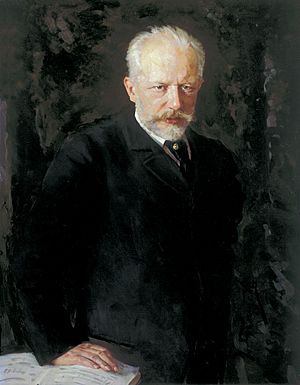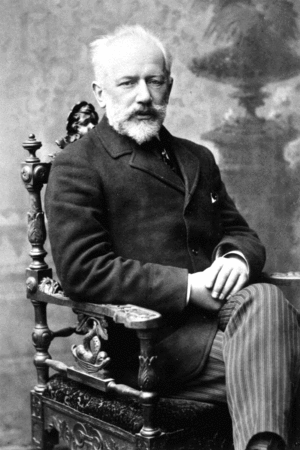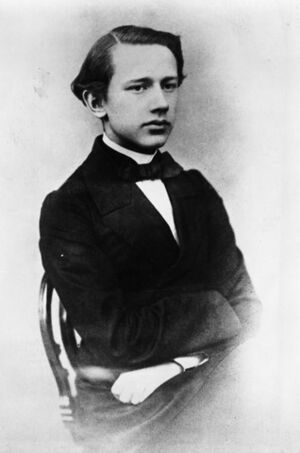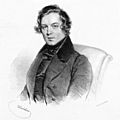Pyotr Ilyich Tchaikovsky facts for kids
Quick facts for kids
Pyotr Ilyich Tchaikovsky
|
|
|---|---|

Pyotr Ilyich Tchaikovsky by Nikolay Kuznetsov, 1893
|
|
| Background information | |
| Born | May 7, 1840 Kamsko-Votkinsk |
| Died | November 6, 1893 (aged 53) St Petersburg |
| Occupation(s) | Composer |
| Instruments | Piano |
Pyotr Ilyich Tchaikovsky (pronounced chai-KOV-skee) was a famous Russian composer. He was born in Kamsko-Votkinsk on May 7, 1840. Tchaikovsky lived during the Romantic period of music. He is known for writing very emotional and dramatic melodies.
He studied music from Western Europe. However, his music also has a strong Russian sound. Tchaikovsky wrote many different types of music. These include 11 operas, 3 ballets, and over 100 songs. His most famous ballets are Swan Lake, The Nutcracker, and Sleeping Beauty. These ballets have some of the most recognized tunes in all of classical music. Many people consider him the greatest composer of ballets.
Contents
Early Life and Education
Tchaikovsky's father was a Ukrainian mining engineer. His mother's grandfather was French. Tchaikovsky started piano lessons when he was only five years old. He quickly became very good at playing. His family owned an orchestrion. This was a musical box that played classical tunes. It introduced him to music by composers like Mozart and Rossini.
In 1848, his family moved to St. Petersburg. Tchaikovsky was often separated from his family. This made him feel unhappy. In 1854, his mother passed away. He found comfort in playing music. He spent nine years studying at the School of Jurisprudence. After school, he worked as a clerk for four years.
Then, a famous composer named Anton Rubinstein helped him. Tchaikovsky became a music student at the new conservatory in St. Petersburg. He learned to play the flute, organ, and piano. He also studied how to compose music. In 1866, he moved to Moscow. There, Anton's brother, Nikolai Rubinstein, encouraged him. Nikolai told Tchaikovsky to write music that sounded very Russian. Tchaikovsky worked very hard. He finished his First Symphony, which was performed in 1868.
Years of Growing Fame
In 1875, Tchaikovsky began a long trip around Europe. He liked Bizet’s opera Carmen. However, he found Wagner’s operas from the Ring cycle boring. In 1877, he completed Swan Lake. This was the first of his three famous ballets. At first, the audience did not like it much. This was because the dancers were not very good.
Tchaikovsky decided to get married in the summer of 1877. His wife was Antonina Milyukova. The marriage did not work out well. A few weeks later, he left and never lived with her again.
Another woman became important in his life. Her name was Nadezhda von Meck. She was a wealthy woman who loved Tchaikovsky’s music. She promised to pay him a lot of money every month. The only condition was that they never meet in person. This support meant Tchaikovsky no longer needed to work. He could quit his teaching job at the Conservatory. For several years, he spent winters in Europe and summers in Russia.
Later Years and Masterpieces

By 1885, Tchaikovsky was tired of traveling. He rented a country house in Klin, near Moscow. He lived a calm life there. He enjoyed reading, walking in the forest, and composing music during the day. In the evenings, he played music with his friends. He became more confident as a conductor. He toured Europe twice, leading concerts in cities like Leipzig, Berlin, Paris, and London.
In 1889, he finished his second ballet, The Sleeping Beauty. The next year, while in Florence, he wrote his famous opera The Queen of Spades. This opera was based on a story by Pushkin. Later that year, Nadezhda von Meck wrote to him. She said she had lost most of her money. She could no longer support him financially.
In the spring of 1891, he was invited to conduct in New York. This was for the opening of Carnegie Hall. He also conducted concerts in Baltimore and Philadelphia. When he returned to Russia, he wrote his last ballet, The Nutcracker. He also wrote his Sixth Symphony, known as the “Pathétique.” Many people consider this his best work. It was performed in St Petersburg on October 16, 1893. Five days later, he suddenly became ill with cholera. This was a disease many people were catching in the city. Tchaikovsky died four days later, on November 6, 1893.
Images for kids
-
Postcard collage (1862) of photos of Anton (right) and Nikolai Rubinstein
-
The young Mily Balakirev, c. 1866
-
The conductor Hans von Bülow
-
Nadezhda von Meck, Tchaikovsky's patroness and confidante from 1877 to 1890
-
Emperor Alexander III by Nadar
-
Robert Schumann, lithograph by Josef Kriehuber, in 1839
-
Statue of Tchaikovsky in Simferopol, Crimea
See also
 In Spanish: Piotr Ilich Chaikovski para niños
In Spanish: Piotr Ilich Chaikovski para niños















